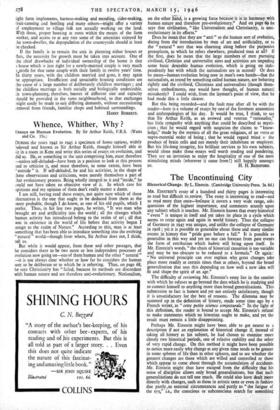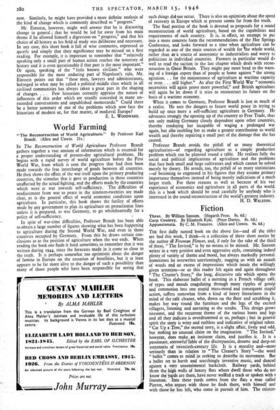The Uncontinuing City
MR. EINSTEIN'S essay of a hundred and thirty pages is interesting to read but difficult to, review. The essay is interesting to read—and to read more than once—beCause it covers a very wide range, asks questions of the highest importance, and comments acutely upon any subject which it touches. Mr. Einstein knows that every historical " event " is unique in itself and yet takes its place in a cycle which seems to recur again and again in world history. Thus the collapse of Germany in 1945 was unique, and unlike the collapse of Germany in 1918 ; yet it is possible to generalise about these and many similar events in history that " pride goes before a fall." It is possible to generalise in this way and yet no one can forecast from past events the form of retribution which hubris will bring upon itself. In Mr. Einstein's words, " the chain of historical causation is too variable and may be too obscure to be reduced to a formula." Or again: "No universal principle can ever explain why great changes take place more readily at certain times than at others, beyond the broad generalisation that sees this depending on how well a new idea will fit and shape the spirit of an age."
The difficulty of reviewing Mr. Einstein's essay lies in the caution with which he refuses to go beyond the data which he is studying and to commit himself to anything more than broad generalisations. This submission to fact is honest and yet not entirely satisfactory, though it is unsatisfactory for the best of reasons. The dilemma may be summed up in the definition of history, made some time ago by a French writer, as "cette petite science conjecturale." In the light of this definition, the reader is bound to accept Mr. Einstein's refusal to make statements which no historian ought to make, and yet the result must remain a little -disappointing.
Perhaps Mr. Einstein might have been able to get nearer to a description if not an explanation of historical change if, instead of taking all history as his subject, he had chosen to examine more closely two historical periods, one of relative stability and the other of very rapid change. On this method it might have been possible to notice more easily why change at any given time tends to be greater in some spheres of life than in other spheres, and to see whether the greatest changes are those which are willed and controlled or those which appear to come about through the accumulation of accidents. Mr. Einstein might thus have escaped from the difficUlty that his sense of discipline allows only broad generalisations, but that such generalisations do not tell one much. He could also have dealt more directly with changes, such as those in artistic taste or even in fashion due partly .to external circumstances and partly to " the fatigue of the eye," i.e., the conscious or subconscious search for something
new. Similarly, he might have provided a more definite analysis of the kind of change which is commonly described as " progress."
Mr. Einstein, however, might well answer that he is discussing change in general ; that he would be led far away from his main theme if he allowed himself a digression on " progress," and that his choice of all history as his field of study was deliberate and necessary. In any case, this short book is full of wise comments, expressed so quietly and simply that their significance may be missed on a first reading. For example, it is important to remember that " relatively speaking only a small part of human action reaches the notoriety of history and it is even questionable if that part is the most important." Or again, speaking of the " little known civilians " who were responsible for the most enduring part of Napoleon's rule, Mr. Einstein points out that " these men, lawyers and administrators, belonged to what may be called a political middle class which in all civilised communities has always taken a great part in the shaping of changes. . . . Few historians correctly appraise the nature of influences of this order which are usually concealed in many un- recorded conversations and unpublished memoranda." Could there be a better summary of one of the problems which now face the historians of modern or, for that matter, of medieval Europe?
E. L. WOODWARD.



























 Previous page
Previous page